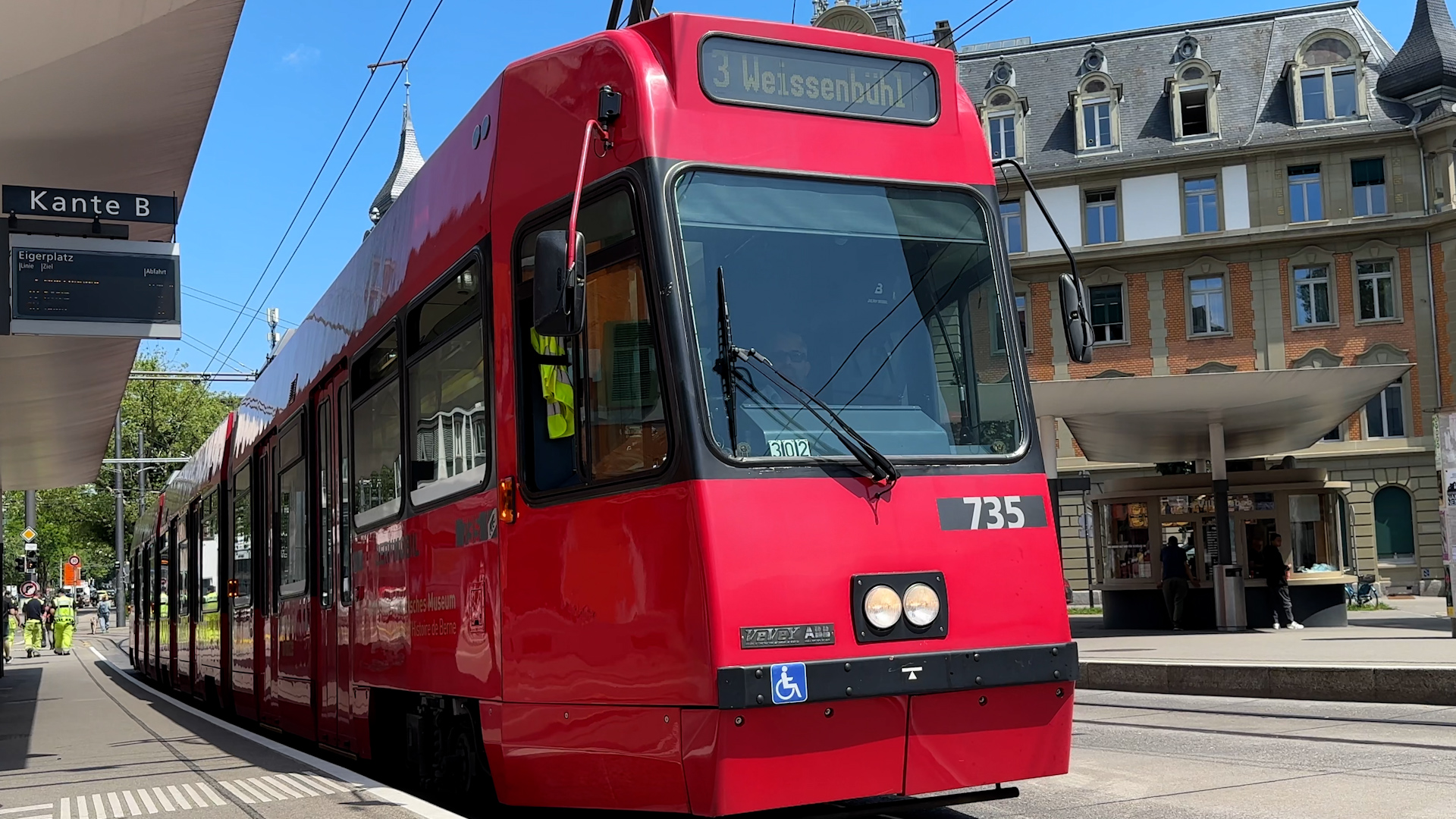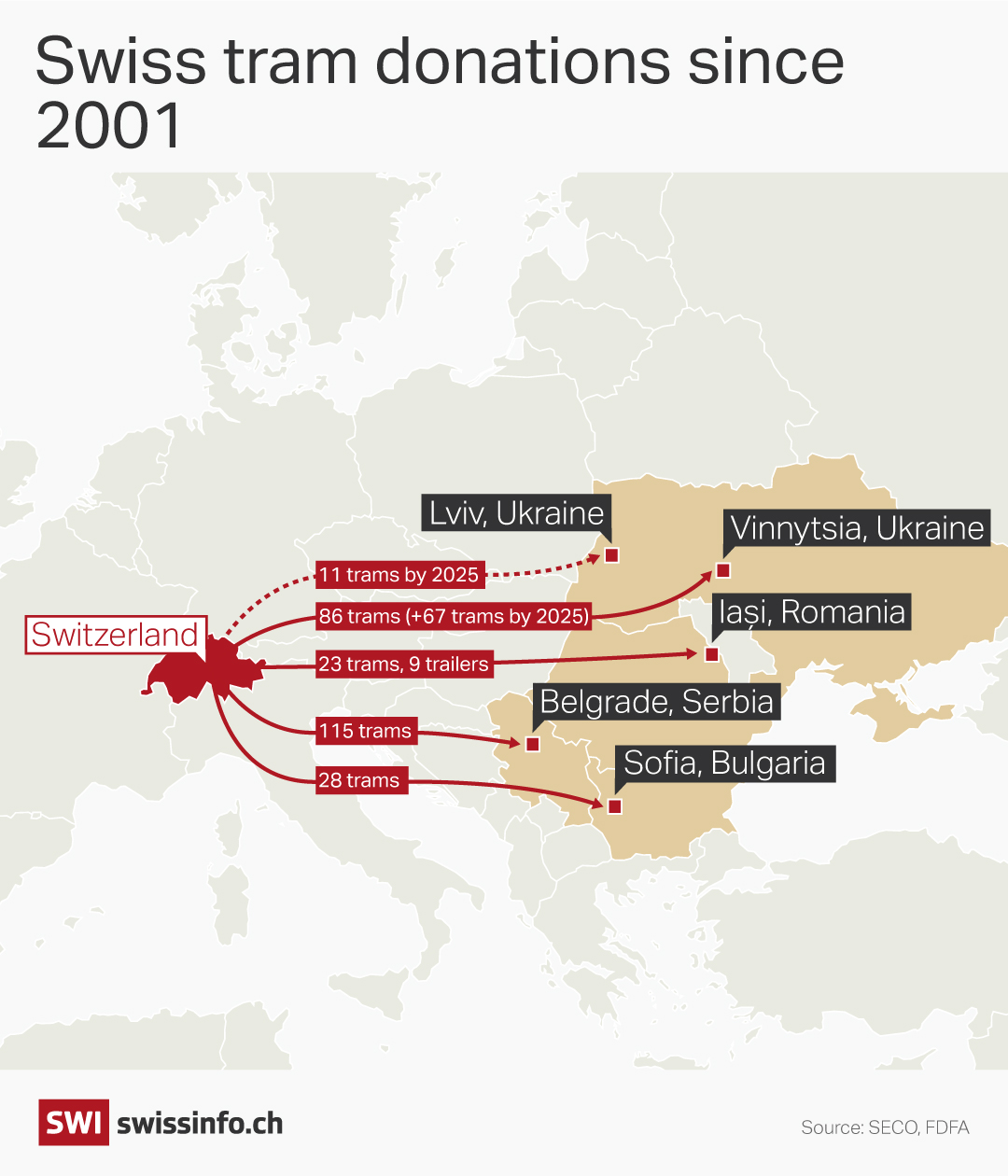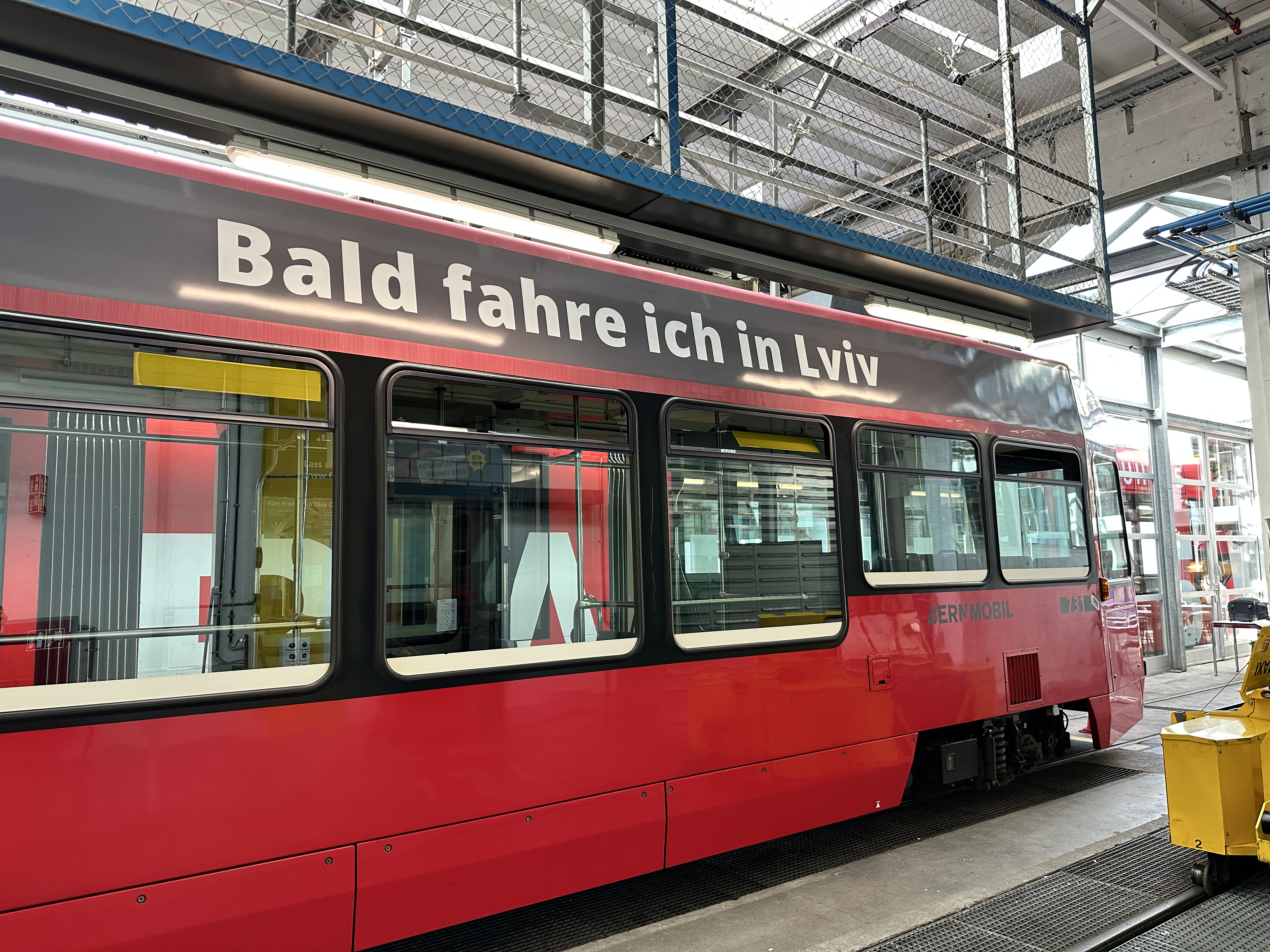Why Swiss trams have become sought-after vehicles in Ukraine

Bern and Zurich are donating used trams to cities in Ukraine struggling from the effects of the war with Russia. The conflict has made the transfer of the 34-tonne vehicles all the more challenging – and indispensable.
The western city of Lviv may be far from the frontline in eastern Ukraine, but it hasn’t been left untouched by the Russian invasion. Among the most tangible transformations is its population growth: from a pre-war figure of 783,000 just two-and-a-half years ago, the city is now home to some 933,000 inhabitants – and counting.
The new arrivals include businesses and people fleeing attacks in the east and south, the war wounded among them. These new residents are putting pressure on the city’s infrastructure, including its public transportation system.
“More and more disabled people are arriving every day,” says Roman Mulyar, chief engineer at Lvivelectrotrans (LET), which operates Lviv’s trams and trolleybuses. “They have difficulty to enter the trams with their high floors.”
To address this problem, Ukraine approached Switzerland, which finances sustainable urban-development projects in the country as part of its foreign aid programme. It’s one of just a handful of European states to subsidise, either in full or in part, the donation of used trams to other countries.
For Lviv, Switzerland scooped up 11 decommissioned low-floor trams from Bern that are more accessible for people in wheelchairs or with disabilities.

More
Swiss trams embark on a rare journey to Ukraine
Although the Alpine country has donated hundreds of such vehicles to Eastern Europe in the last 20 years, the transfer to Lviv – plus that of several trams from Zurich to Vinnytsia in central Ukraine – marks the first time it’s doing so in the context of war. The risks and uncertainties posed by the conflict have forced Ukraine and Switzerland to rejig – but not give up – their plans.
Replacing a Communist-era tram fleet
In Lviv, where civilian infrastructure has been the target of Russian drone and missile attacks, LET has dealt with multiple war-related challenges. In addition to a shortage of accessible trams, Mulyar cites a lack of spare parts that were mainly produced in eastern Ukraine, and the departure of dozens of staff for the front who, because of their specialised skills, are difficult to replace.

The Bern trams will serve an urgent need in the city: they will run on a new extended line to a recently inaugurated national rehabilitation centre, called Unbroken, that aims to treat up to 10,000 civilians and soldiers per year. The arrival of the vehicles, dubbed “Vevey”External link after their manufacturer, will boost LET’s fleet of low-floor trams from 19 to 29, says the State Secretariat for Economic Affairs (SECO), which is coordinating the donation.
“Mobility is a pivotal issue affecting the country since the Russian military aggression began – it’s essential for the economy, social inclusion and quality of life,” says Marc-Alexandre Graf, SECO programme manager. “The Bern trams are crucial for Lviv. They really need them.”
Aside from improving accessibility, in both Vinnytsia and Lviv the donations will also help to modernise and decarbonise the cities’ public transportation systems. Although the Vevey trams are over 30 years old, they are less energy intensive than Lviv’s ageing Communist-era tram fleet and are expected to run for another ten to 12 years.
Swiss trams are decommissioned once they’ve reached their target usage span (for example, in Zurich, it’s 40 years) and no longer adhere to regulations on accessibility and energy efficiency.
Cost is also a factor, says Gwendoline Levasseur of Zurich public transport provider, VBZ: maintaining older trams in good condition is relatively expensive in Switzerland, whereas in Ukraine their lifespan can be extended by roughly another 15 years, at a lower cost.
As part of the donation, SECO finances four weeks of training for Ukrainian staff. It also covers the cost of spare parts, assistance in engineering adaptations – so the trams meet local certification requirements – and transportation of the trams to Ukraine.
“As far as we know, Switzerland is the only country so far that has financed [such] broad projects for the transfer of used trams,” says Graf. SECO is covering the full cost of the Lviv donation to the tune of CHF1.8 million ($2 million).
Generally, transfers are possible to destinations where similar tram infrastructure exists and the vehicles can be transported over a relatively short distance, Graf explains. In the last 20 years, Switzerland has sent trams to Romania, Serbia and Ukraine. Similarly, German and Austrian cities have donated to Poland, Romania and Bulgaria. Ukraine alone has received trams from several German municipalities, as well as from Riga in Latvia and Prague in Czechia.

The need for trams is so great in Lviv that Berlin recently announced it would donate 12 trams first used in the mid-1970s. Lviv also receivedExternal link a €17.4 million (CHF16.9 million) loan from the European Investment Bank to buy ten brand-new low-floor trams.
Delays and change of plans due to the war
The Berlin trams, however, are not low-floor vehicles. The same is true of used Zurich trams destined for Vinnytsia: 67 of them are being sent as part of a Swiss project that was launched before the war to help improve urban mobility.
Like Lviv, Vinnytsia (population 417,000) has seen an influx of internally displaced persons (IDPs). Over 300 businesses alone have relocated to its relative safety, says SECO. It too has an ageing fleet of vehicles but plans to extend the rail network.
Here too the Swiss trams will fill a demand for more accessible models. Several of the carriages will be used just for their spare parts: the Ukrainians will use the joints to attach new low-floor carriages they plan to build themselves onto the Zurich trams.

But the Russian invasion has caused hiccups in the transfer.
“It was on hold for several months because we weren’t sure we could transport the trams with a guarantee of safety for staff,” says Graf. Plans to send the trams by rail all the way to Vinnytsia also had to be adjusted as war raged, driving up costs. SECO has allocated CHF4.7 million for the donation.
A first transfer finally went ahead in 2023. In all 35 trams arrived at the Ukrainian-Polish border by rail before being loaded onto long-bed trucks for the final leg of their two-week-long journey to Vinnytsia.
Other travel plans, however, had to be cancelled, says Gwendoline Levasseur of the Zurich public transport provider, VBZ. Instead of the Swiss project teams visiting the destination cities to establish a link and train local personnel – just as they did when Zurich donated 86 trams to Vinnytsia in 2008-2012 – the Ukrainians came to Switzerland. The conflict situation made it too risky for the Swiss to travel to Ukraine.
In Bern, Mulyar and three of his colleagues spent four weeks learning to drive, maintain and repair the Vevey trams.

Decommissioned trams ‘good value for money’
In Vinnytsia, most of the trams sent in 2008-2012 – which are now over 50 years old – “are in very good condition and remain in operation”, says Levasseur.
Crucially, the trams have “contributed to a substantial improvement in the public transport system”, Graf says, pointing out that ridership grew by 26%. “The transfer of functional second-hand trams offers good value for money for the municipality, which has limited financial means.”
Despite the support it has received, Lviv needs more trams still. The IDP population in Ukrainian cities is likely much higher than official figures suggest, says SECO, as many people staying with friends and family do not register with local authorities. Many of them are also expected to remain even after the war, so demand will continue to grow.
Martin Häfliger, a technical consultant who’s helped to implement all of Switzerland’s tram donations, is on the case. At the time of writing, the expert planned to inspect used trams in a northern Swiss city to see if they’re compatible with Lviv’s rail infrastructure. If these don’t pan out, he knows of another municipality in Switzerland that will decommission trams in a couple of years’ time – a possible future donation, with any luck.
Edited by Virginie Mangin

In compliance with the JTI standards
More: SWI swissinfo.ch certified by the Journalism Trust Initiative









You can find an overview of ongoing debates with our journalists here . Please join us!
If you want to start a conversation about a topic raised in this article or want to report factual errors, email us at english@swissinfo.ch.